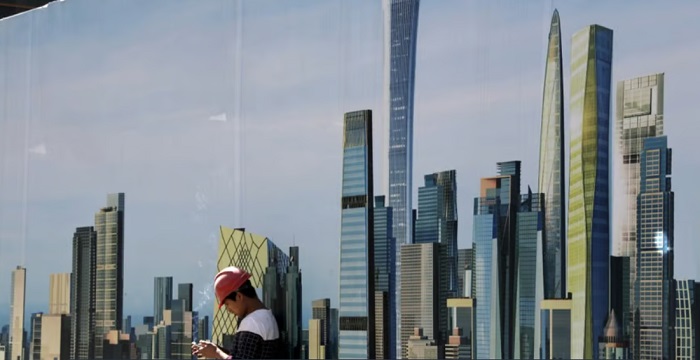
Executives working in China’s state-owned financial institutions say they are bracing for “one of the toughest years” they have seen, as Beijing seeks to tighten its grip on the sector.
That means no more wining and dining, as belt-tightening and pay cuts become the norm, along with long hours of compulsory ideological training.
Morale has plummeted since the overhaul of the sector was announced in March, according to four executives working at state financial institutions. President Xi Jinping initiated the plan, which aims to fight corruption in the sector and bring it under more direct control of the ruling Communist Party.
The executives, who declined to be named, said the campaign was now the top priority at their companies and was expected to run well into autumn.
They described the uncertainty brought by the “relentless” ideological and anti-corruption drives, and sharp pay cuts in the range of 15 to 20 per cent of their basic salaries, with annual bonuses set to be slashed by at least 30 per cent this year.
A manager at a state-owned securities firm in Shanghai said a recent ideological study session at the company was on the Red Army’s Long March.
“Probably our party secretary wants us to be mentally prepared for tougher times ahead,” he said. “State-owned financial companies aren’t an exception. They’re also part of China’s austerity drive at a time when the economy isn’t doing well, and as many civil servants get their pay cut too.”
He said pay cuts in the financial sector were in line with Xi’s “common prosperity” goal to narrow the wealth gap in China.
Beijing has vowed to put an end to extravagance among what it calls “financial elites” in the state sector, as Xi tries to push its institutions to comply with his vision.
And with tensions rising between China and the West – in particular the United States – Beijing is urging its state banks to allocate more money to areas seen as priorities for the nation, such as technology self-reliance projects and advanced manufacturing.
Beijing is also closely watching its bankers and financial regulators for any sign of collusion with foreign financial institutions on facilitating large outflows of Chinese funds.
It is also concerned about ballooning local government debt and wants lenders to exercise caution on loans, while at the same time keeping an eye on the weaker financial institutions amid a banking crisis in the US, and as it tries to revive the economy.
Beijing’s overhaul of the state financial sector is part of efforts to control risks and – in a typical move from Xi’s playbook – aimed at strengthening the party’s control over financial policymaking.
The creation of a new Central Financial Commission will be key to this goal, with 400 trillion yuan (US$55 trillion) of banking and insurance assets placed under the party’s watch. The commission was established under the Central Committee, the party’s top decision-making body.
A powerful new financial regulator has also been set up. The National Financial Regulatory Administration has replaced the China Banking and Insurance Regulatory Commission and taken on some duties of the central bank’s supervisory body as well as the securities regulator.
Ideological training has also become a priority in the overhaul. One middle manager at a leading Chinese investment bank said its top executives had been asked to return to the company’s Beijing headquarters at the end of May.
“They all had to supervise week-long study sessions for middle managers,” he said. “We studied President Xi’s original works and his instructions on the financial sector and spent hours soul-searching and writing reports on the main takeaways [from the sessions].”
He said managers had received a memo from the bank’s chairman saying the education campaign was the top priority and the sessions could not be skipped. An inspection team from the party was supervising the campaign at the bank.
The campaign to instil Xi’s political philosophy is widespread throughout party and state organs, but in the financial sector the focus is on stamping out corruption and extravagance.
The party’s graft-buster has stepped up a sweeping anti-corruption drive, with the vast and opaque financial sector in its cross hairs. It has taken disciplinary action against 87 state bankers, insurers and financial regulators in the first six months of the year – more than the 77 for all of 2022, according to a tally by the South China Morning Post.
In June alone, the Central Commission for Discipline Inspection announced action had been taken against 23 people in the sector.
Guo Shuqing, party chief of the People’s Bank of China (PBOC), the central bank, last week told a top-level meeting that the financial sector still “lagged behind on anti-corruption work”.
He urged cadres in the sector to “keep a clear head and learn profound lessons” from previous corruption cases, especially former PBOC deputy governor Fan Yifei.
Fan was expelled from the Communist Party and dismissed from public office on June 9 after being placed under investigation by the disciplinary body in November. He is the most senior central banker caught up in the corruption crackdown in the past two years.
Guo’s deputy Pan Gongsheng – who is also party secretary and director of the State Administration of Foreign Exchange – told the same meeting that anti-corruption measures should be strengthened for young cadres in key positions.
A PBOC official who attended the meeting said Xi had “a very bad impression” of the financial sector from hearing details of previous corruption cases. “The message is very clear – if we don’t buck up when it comes to discipline, we risk losing his trust.” (SCMP)
